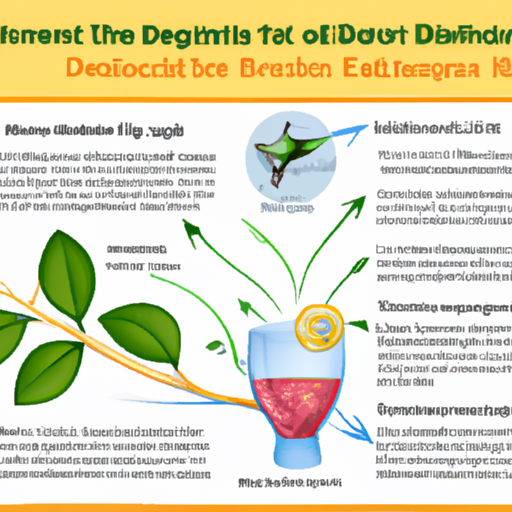Berberine, a natural health supplement derived from various plants, has gained recognition for its potential health benefits. It is known for its wide range of properties, including anti-inflammatory, antioxidant, and antimicrobial effects. One of the most well-researched uses of berberine is its ability to regulate blood sugar levels and reduce cholesterol, making it beneficial for individuals with conditions like type 2 diabetes or insulin resistance. However, there is a pressing question that remains: Does berberine detox the liver? In this article, we will explore the potential detoxifying effects of berberine on the liver and shed light on its overall impact on metabolic health. Before incorporating any new supplement into your routine, it is crucial to consult with a healthcare professional, especially if you have pre-existing health conditions or are taking other medications, as berberine may interact with certain drugs.

What is Berberine?
Berberine is a natural health supplement derived from various plants such as Berberis vulgaris (barberry), Berberis aristata (tree turmeric), and Coptis chinensis (goldthread). It has a long history of use in traditional Chinese medicine and Ayurvedic medicine due to its potential health benefits. This plant-derived compound is known for its diverse properties, including anti-inflammatory, antioxidant, and antimicrobial effects.
Derivation from Plants
Berberine is extracted from the roots, bark, and stems of the aforementioned plants. These plants have a rich history of traditional use and are believed to possess medicinal properties. The extraction process involves isolating the berberine compound and using it in various forms, such as capsules or liquid extracts.
Traditional Use in Chinese and Ayurvedic Medicine
Berberine has been utilized for centuries in traditional Chinese medicine and Ayurvedic medicine. In Chinese medicine, it is often used to address symptoms associated with gastrointestinal issues, such as diarrhea and infection. Ayurvedic medicine incorporates berberine to support liver and digestive health, among other applications. This long-standing use in traditional medicine highlights the historical significance of berberine as a natural remedy.
Properties of Berberine
Berberine possesses a wide range of properties that contribute to its potential health benefits. One of its notable effects is its ability to regulate blood sugar levels. Studies have shown that berberine can help improve insulin sensitivity and reduce fasting blood glucose levels, making it potentially beneficial for individuals with type 2 diabetes or insulin resistance.
Furthermore, berberine has been shown to have a positive impact on cholesterol levels. It can help reduce both total cholesterol and LDL (low-density lipoprotein or “bad” cholesterol), which are key factors in maintaining cardiovascular health. These cholesterol-lowering properties suggest potential benefits in improving overall cardiovascular health.

Berberine and Metabolic Health
Regulation of Blood Sugar Levels
One of the key benefits of berberine is its ability to regulate blood sugar levels. Research has demonstrated that berberine can activate an enzyme called AMPK (adenosine monophosphate-activated protein kinase), which plays a crucial role in glucose metabolism. By activating AMPK, berberine helps promote glucose uptake by cells, decrease glucose production in the liver, and enhance insulin sensitivity.
Beneficial for Individuals with Type 2 Diabetes or Insulin Resistance
Berberine’s ability to regulate blood sugar levels makes it particularly beneficial for individuals with type 2 diabetes or insulin resistance. Clinical studies have shown that berberine supplementation can effectively lower fasting blood glucose levels, improve insulin resistance, and reduce HbA1c levels (a marker of long-term blood sugar control). These findings suggest that berberine could be a useful complementary approach in managing diabetes.
Reduction of Cholesterol Levels
Berberine has also been found to have a positive impact on lipid metabolism, particularly in reducing cholesterol levels. It works by inhibiting an enzyme called PCSK9 (proprotein convertase subtilisin/kexin type 9), which regulates the removal of LDL cholesterol from the bloodstream. By inhibiting PCSK9, berberine helps increase the clearance of LDL cholesterol and promotes the liver’s ability to remove excess cholesterol.
Improvement of Cardiovascular Health
The reduction of cholesterol levels achieved by berberine contributes to improved cardiovascular health. High levels of LDL cholesterol are a primary risk factor for cardiovascular disease. By lowering LDL cholesterol levels, berberine can potentially reduce the risk of developing cardiovascular conditions such as heart disease and stroke. Additionally, berberine’s ability to regulate blood sugar levels and improve insulin sensitivity may further contribute to cardiovascular health.
Popularity of Berberine as a Supplement
Due to its potential benefits for metabolic health, berberine has gained popularity as a natural supplement. Many individuals are turning to berberine to support overall metabolic health and optimize their blood sugar and cholesterol levels. However, it is essential to consult with a healthcare professional before starting any new supplement, especially if you have pre-existing health conditions or are taking other medications. Berberine may interact with certain drugs, making it crucial to ensure its safe and effective use.

The Role of the Liver in Detoxification
Liver as a Detoxification Organ
The liver is a vital organ responsible for various metabolic functions, including detoxification. It plays a crucial role in filtering and neutralizing toxins, drugs, and other harmful substances present in the bloodstream. The liver detoxification process serves to convert these harmful compounds into less toxic or water-soluble forms for elimination from the body.
Metabolism and Elimination of Toxins
Toxins and foreign substances that enter the body undergo a two-step process in the liver called phase I and phase II detoxification. In phase I, enzymes convert these substances into more reactive metabolites. Then, in phase II, conjugation reactions occur, attaching molecules to the reactive metabolites to make them easier to eliminate.
The Importance of Liver Health
Maintaining optimal liver health is crucial for overall well-being. A healthy liver ensures efficient detoxification and elimination of potentially harmful substances. It also plays a role in various other metabolic processes, such as nutrient metabolism, hormone production, and bile secretion. Supporting liver health is essential for maintaining a healthy body and preventing liver-related disorders.
Claims of Berberine’s Liver Detoxification Abilities
Supporting Liver Function
Berberine has been implicated in supporting liver function and promoting its overall health. It is believed to exert its effects by modulating various signaling pathways involved in liver metabolism. By influencing these pathways, berberine may enhance liver function and aid in its ability to process and eliminate toxins and harmful substances from the body.
Enhancing Liver Detoxification Processes
Studies suggest that berberine may enhance and optimize the liver’s detoxification processes. Animal research has demonstrated that berberine supplementation can increase the activity of specific enzymes involved in phase I and phase II detoxification, such as cytochrome P450 and glutathione S-transferase. These enzymes play a crucial role in converting and eliminating toxins, and berberine’s enhancement of their activity could enhance liver detoxification.
Protecting the Liver from Damage
Berberine has also shown potential in protecting the liver from damage caused by various factors. Its antioxidant properties help combat oxidative stress, a condition characterized by an imbalance between the production of free radicals and the body’s ability to neutralize their harmful effects. Oxidative stress can lead to liver damage, and berberine’s antioxidant effects may help mitigate this damage and maintain liver health.

Scientific Studies on Berberine and Liver Health
Research on Animals
While there is a growing body of scientific research on berberine and its potential effects on liver health, the majority of studies conducted thus far have been on animals. Animal studies have shown promising results, with berberine demonstrating hepatoprotective effects, enhancing liver function, and improving liver enzyme activities.
Limited Human Studies
In comparison to animal studies, there is a scarcity of rigorous human studies investigating the effects of berberine on liver health. While some research has been conducted on humans, more large-scale clinical trials are needed to establish the extent of berberine’s effects on liver detoxification and overall liver health in humans.
Promising Results
Despite the limited human studies, the available research suggests that berberine holds promise in promoting liver health. Preliminary findings indicate that berberine may positively impact liver function and support liver detoxification processes. However, further research involving larger human trials is necessary to strengthen these findings and ascertain the full scope of berberine’s effects on liver health.
Effects of Berberine on Liver Enzymes
Impact on Liver Enzymes
Berberine has been shown to have a significant impact on various liver enzymes involved in the detoxification process. It can modulate the activity of enzymes such as cytochrome P450, glutathione S-transferase, and UDP-glucuronosyltransferase, leading to enhanced metabolic activities of the liver.
Specific Enzymes Affected
Studies have found that berberine can increase the activity of cytochrome P450, an important enzyme group responsible for metabolizing and eliminating numerous drugs and toxins. Additionally, berberine has been shown to enhance glutathione S-transferase activity, which is involved in the conjugation reactions during phase II detoxification. The modulation of these enzymes by berberine suggests its potential in optimizing liver detoxification processes.
Potential Implications
The impact of berberine on liver enzymes may have several implications for liver health. By increasing the activity of enzymes involved in drug metabolism and detoxification, berberine can potentially enhance the liver’s capacity to process and eliminate toxins and harmful substances. However, further research is needed to fully understand the extent of berberine’s impact on liver enzyme activity and its implications for overall liver health.

Considerations when Using Berberine for Liver Health
Dosage and Formulation
When considering the use of berberine for liver health, it is essential to pay attention to the dosage and formulation. The optimal dosage of berberine may vary depending on the individual’s specific needs and health conditions. Consulting a healthcare professional experienced in herbal medicine is crucial to determine the appropriate dosage and ensure safe and effective use.
Possible Side Effects
While berberine is generally well-tolerated, it may cause certain side effects in some individuals. Common side effects include gastrointestinal symptoms such as diarrhea, constipation, and abdominal pain. Rarely, high doses of berberine have been associated with potential adverse effects on liver function. It is crucial to monitor for any unusual symptoms and discontinue use if any adverse reactions occur.
Drug Interactions
Berberine may interact with certain medications, particularly those metabolized by cytochrome P450 enzymes. These enzymes are involved in the metabolism of various drugs, and if their activity is affected by berberine, it may alter the effectiveness and safety of these medications. It is vital to discuss the potential drug interactions with a healthcare professional before combining berberine with any other medications.
Expert Opinions on Berberine and Liver Detoxification
Medical Professionals’ Perspectives
Medical professionals recognize the potential of berberine in supporting liver health and optimizing its detoxification processes. Many healthcare providers recommend considering berberine as part of a comprehensive approach to liver health and detoxification. However, they stress the importance of evidence-based practice and emphasize the need for further research to fully understand berberine’s effects on liver function.
Researcher Insights
Researchers studying the effects of berberine on liver health acknowledge the promising results obtained from animal studies. They emphasize the necessity and value of conducting more extensive human trials to establish the efficacy and safety of berberine as a liver detoxification agent. While preliminary findings are encouraging, additional research is needed to solidify the scientific consensus on berberine’s role in liver health.
Conclusion
In conclusion, berberine is a natural health supplement derived from plants that has gained popularity due to its potential benefits for metabolic health. It has been used for centuries in traditional Chinese medicine and Ayurvedic medicine for its various properties. Berberine has been extensively researched for its ability to regulate blood sugar levels, reduce cholesterol, and improve cardiovascular health.
While berberine shows promise in supporting liver health and enhancing liver detoxification processes, further research is needed to fully understand its effects on the liver. Animal studies have provided encouraging results, but human trials are limited. Consulting a healthcare professional before starting any new supplement, including berberine, is essential to ensure safe and effective use.
Berberine holds great potential in promoting overall health, particularly in the context of metabolic health and liver function. However, it is crucial to approach its use with caution and seek guidance from healthcare professionals to maximize its benefits while minimizing any potential risks. By staying informed and consulting experts, you can make the best decisions for your health and well-being.







